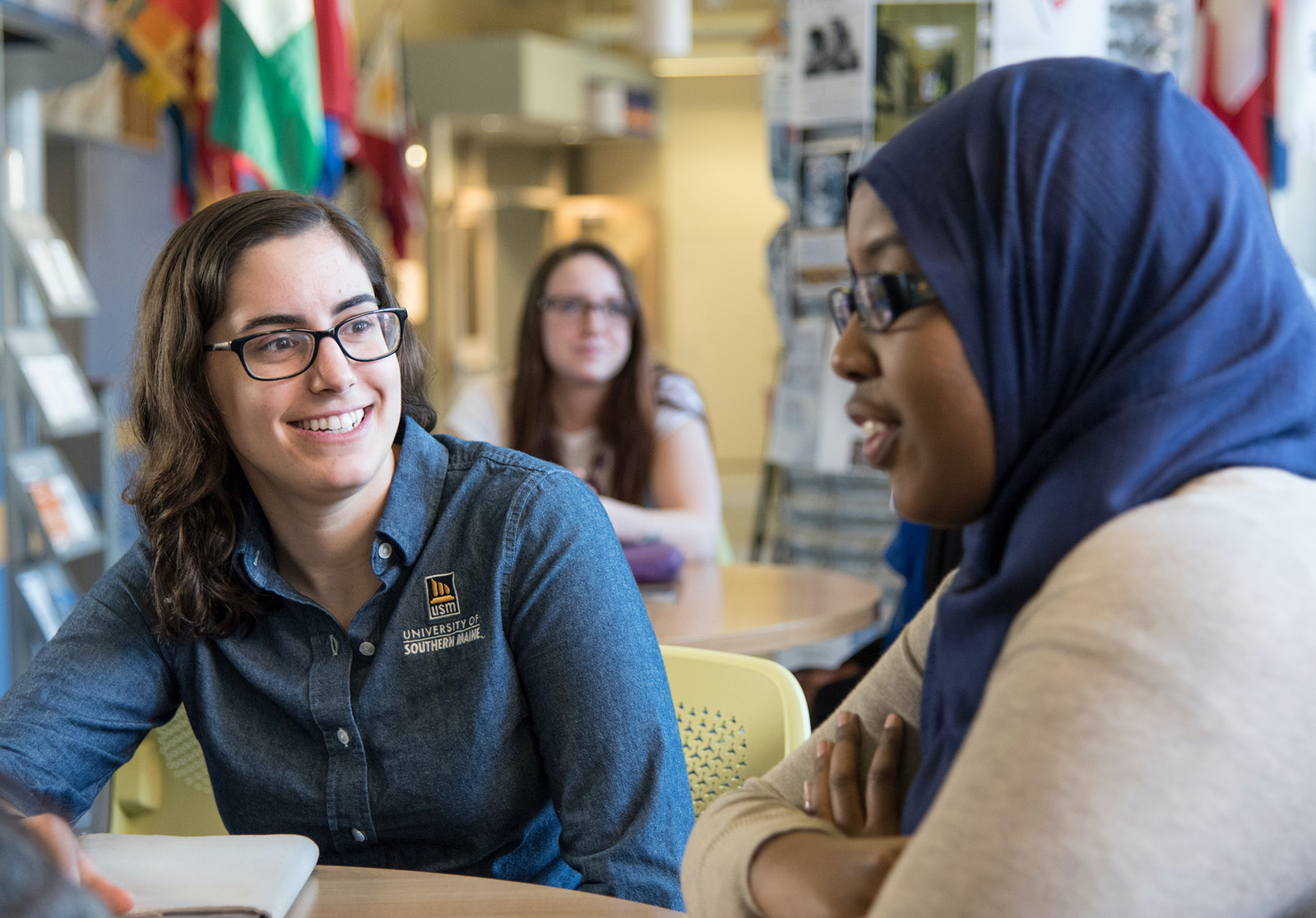Upon granting unified accreditation to the University of Maine System in July 2020, our regional accreditor, the New England Commission of Higher Education (NECHE), asked us to prepare a self-study in advance of a Fall 2022 visit by a NECHE-appointed evaluation team. The introduction and institutional overview can be found on this page.

The University of Maine System’s (UMS) June 2020 substantive change application requesting unified accreditation for UMS, its seven universities, and the University of Maine School of Law (Law School) followed a multi-year exploration of that operating model in close communication with the Commission.
[UMS] began serious discussions with the Commission in 2015 about the possibility of one institutional accreditation for all [UMS] universities to better fulfill its statewide mission and coordinate its academic program offerings in a resource-constrained environment. A primary issue addressed in all discussions since that time is whether [UMS] can meet its chartered mission to coordinate its academic program across and among all UMS universities with its universities separately accredited, requiring each to maintain control over its own academic program and be sufficiently resourced to meet all accreditation standards on its own (UMS substantive change request, p. 2).
Independent assessments of unified accreditation’s viability by NECHE and UMS; then-recent strategic direction set by the UMS Board of Trustees; and encouraging feedback from the U.S. Department of Education about UMS’s ability to offer federal financial aid as a System confirmed and catalyzed our desire to pursue a unified-accredited structure.
Upon granting accreditation to UMS in July 2020, the Commission directed us to prepare for an interim evaluation visit in May 2021 and a comprehensive evaluation in fall 2022.
Following the May 2021 visit, the two evaluators filed a report describing UMS as having made “significant progress in many areas, particularly those that are foundational to building a unified accreditation model” (p. 2). In its November 29, 2021 letter to Chancellor Malloy, the Commission noted that
While viewpoints about the necessity or value of unified accreditation vary, the [evaluation] team confirmed that there is a consensus that access to high-quality educational programs, transferability, and student success, including student completion, are central to the success of the mission of [UMS], and the development of underlying process[es] and systems across the campuses is a significant step forward in improving and leveraging [UMS’s] value (p. 3).
An initial discussion about the self study process and timeline was held in October 2020. Nine draft writing teams—with faculty, staff, and administrators from the seven universities and the Law School— began work in February 2021 and submitted their drafts in May 2021. An editorial group combined and expanded the drafts into the first full narrative, which was shared with the UMS community for review and feedback in September 2021. In January 2022, UMS shared a draft with NECHE Vice President Carol Anderson, who provided invaluable direction.
A second public draft was posted for UMS community review and feedback in February 2022, and a third in May 2022.
Data teams comprising institutional research and assessment staff (UMS and university-based) and faculty representatives began forging common definitions and populating the Data First and E Series forms in summer 2021. The two data sets were shared in April 2022 with faculty senate/assembly presidents, provosts, accreditation officers, financial aid directors, and registrars for their review and feedback.
Construction of the self study’s digital workroom began in December 2021 as a collaboration among university and Law School accreditation officers, university IR staff, and UMS staff. The workroom was largely in place as of May 2022.
A Self Study Steering Committee, the outgrowth of a unified accreditation project management team, was formed in late fall 2021 to guide the work to completion. The committee includes UMS senior staff, a university vice provost, a faculty member, and a graduate student. In addition to advising on editorial choices and sharing input about preparations for the fall visit, Steering Committee members will read the final draft and share recommendations about final content.
UMS published its Notice of Public Comment inviting input on the comprehensive evaluation in the following Maine newspapers in April 2022: the Portland Press Herald, the Bangor Daily News, the Kennebec Journal, the Lewiston Sun Journal, the Machias Valley News Observer, the Calais Advertiser, and the Aroostook County Star-Herald. The notice was also posted on the UMS, university, and Law School websites.
In late May 2022, evaluation team chair Ross Gittell, President of Bryant University, will make a preliminary visit to Maine to discuss fall planning and logistics with UMS senior staff and meet with Chancellor Malloy and the UMS Presidents Council.
UMS finalized the self study in mid-June 2022 in advance of an October 2-5, 2022 visit by the evaluation team. Two notes:
- The University of Maine School of Law is an American Bar Association (ABA) accredited law school within the University of Maine System. Its academic programs adhere to ABA For this reason, it was determined in discussions with NECHE in January 2021, and reaffirmed in writing in December 2021, that UMS would include Law School examples in the narrative, and links to Law School documentation in the digital workroom, but would not supply Data First forms or E Series forms for the Law School.
- In select areas of the University of Southern Maine’s (USM) Data First forms, some Law School data is We note this in the relevant USM forms (7.2-7.5a). The blended data reflects both the Law School’s former administrative housing under USM and the latter’s ongoing support of some Law School business processes.

Institutional Overview
The University of Maine System (UMS) was established by the Maine legislature in 1968. It comprises seven named universities: the University of Maine (UM); the University of Maine at Augusta (UMA); the University of Maine at Farmington (UMF); the University of Maine at Fort Kent (UMFK); the University of Maine at Presque Isle (UMPI); the University of Southern Maine (USM); and the University of Maine at Machias (UMM), a regional campus of the University of Maine; and, the University of Maine School of Law. Information about the history and organizational structure of UMS, its universities, its Law School, and the University of Maine System Board of Trustees (Board) can be found in Standards One and Three.
Unified accreditation, the comprehensive evaluation process, and UMS strategic planning
The last full-scale UMS strategic plan was completed in 2004. Chancellor Malloy and Board leaders began discussing a new planning process in 2020. With the advent of unified accreditation and the development of the NECHE self study, those discussions focused on identifying the best timing for strategic planning in relation to the comprehensive evaluation and resultant action by the Commission. UMS and the Board have jointly sought to ensure that strategic planning harmonizes with the self study, with the evaluation visit, and with requests for improvement shared by the Commission at the conclusion of the evaluation process in spring 2023.
The Board formally charged Chancellor Malloy with launching the strategic planning process in July 2021. The work is being led by the Chancellor and Vice Chancellor Thelen in close coordination with the UMS Presidents Council; a Strategic Planning Working Group comprising UMS staff and university representatives, including faculty; the Board’s Ad Hoc Strategic Planning Committee; and our strategic planning consultant, Huron. In September 2020, UMS launched a strategic planning website featuring regular updates, historical documentation, and a timeline detailing the stages of the process from inception in July 2021 through its expected completion in fall 2023 with a public presentation and the Board’s adoption of the final plan.

Consistent with an issue raised in our June 2020 substantive change request, each university and Law School strategic plan will align with the pillars of the UMS strategic plan while allowing for a range of initiatives and goals specific to their respective plans and missions.
The UMS TRANSFORMS initiative
In October 2020, the Maine-based Harold Alfond Foundation announced a $240 million commitment to UMS, the largest ever made to a public institution of higher learning in New England. The gift’s 12-year implementation entails $170 million in matching funds to be secured by UMS, for a total investment of $410 million in Maine’s public universities.
The gift will advance UMS, its universities, and the Law School in four areas. Known internally as UMS TRANSFORMS, the implementation process is overseen by an Executive Leadership Group, and is managed by a Program Director and by project leads in each area.
(i) Growth and expansion of the Maine Graduate and Professional Center
The Maine Graduate and Professional Center brings together programs in law, business, public policy, engineering, computing, and information science, with active synergies among those programs, their faculty, and their students. A $55 million Alfond gift with a $50 million match focuses on career preparation and leadership development in these fields. The funds will support scholarships and integrated program development. Upon completion of renovations to the University of Maine School of Law’s (Law School) new home in downtown Portland in fall 2022, the Maine Graduate and Professional Center will be co-located in that space.
(ii) Creation of the multi-university Maine College of Engineering, Computing and Information Science (MCECIS)
MCECIS will be a statewide, integrated solution providing the technical workforce and innovations critical to moving Maine’s economy forward, supported by $75 million from the Alfond Foundation gift.
Discussions about MCECIS began in December 2020 with the formation of a Steering Committee with representatives from the University of Maine (UM), University of Southern Maine (USM), and University of Maine at Augusta (UMA). With assistance from the UMS Office of Organizational Effectiveness, the Steering Committee held two System-wide visioning workshops in spring 2021 attended by approximately 110 faculty, staff, and administrators. The Committee also held a related DEI workshop and 14 listening sessions with internal and external stakeholders.
The Steering Committee oversaw the formation of six working committees and a DEI committee. The committees address Undergraduate Engineering; Undergraduate Computing; Graduate Programs and Research; Fundraising and Outreach; Transitions to MCECIS from K-12, Community College, and as Adult Learners; and Organizational Structure. In total, these groups have over 100 members from across UMS, including numerous faculty. Their final reports are due in May 2022.
An MOU for the affiliation of the USM Department of Engineering with MCECIS was negotiated by the UMS Vice Chancellor for Strategic Initiatives and the Presidents of UM and USM. The search for the inaugural dean of MCECIS was launched by the UM Provost in spring 2022 with the goal of filling the position in summer 2022. In a parallel effort, the team of Perkins-Eastman/SMRT has conducted a capital projects master plan for UM facilities for consideration of potential future MCECIS infrastructure needs.

(iii) A set of new student retention and success initiatives
The core student success and retention initiatives of UMS TRANSFORMS are Research Learning Experiences, Gateways to Success, and Pathways to Careers. The latter two focus respectively on high-demand gateway courses typically taken in a student’s first year, and on preparing students for career success through internships and related pre-professional training.
The Research Learning Experiences (RLE) program introduces students to applied research opportunities in a range of courses and fields. RLE was piloted in fall 2021 with 250 UM and UMM students across 31 course sections. A System-wide RLE workshop co-hosted by UM and UMF was attended by more than 100 faculty from all seven universities. For 2022-23, 50 RLE course sections have been approved, and pilots are planned at all seven universities.
RLE is designed to provide students with early and wide participation in their educational paths while increasing retention and student success, particularly in the first two years. The RLE pilot is being assessed, and the results will be used to improve the program and its courses in the next phase of the initiative.
(iv) A substantial investment in University of Maine Athletics program and facilities
The Alfond gift includes a $90 million investment in facilities at UM with a $20 million UM match. The gift will help UM Athletics advance its goals in access, gender equity, community involvement, and competitive excellence, and will strengthen its capacity to assist other UMS universities’ athletic teams.
The first three Athletics capital projects— renovation or replacement of the Women’s Field Hockey, Softball, and Soccer fields— were in the construction document phase as of April 2022.
Diversity, equity, and inclusion across the University of Maine System
In June 2020, Chancellor Malloy issued an Imperative For Change to reinvigorate the collective commitment to diversity, equity, and inclusion (DEI) across UMS. Board and UMS leaders have endorsed a DEI culture renovation and advancement framework focused on demonstrating that DEI is fundamental to:
- Human capital workforce practices: talent acquisition, care and support, advancement, and diversity contributions;
- Education, research, and service: enrollment, care and support, academic relevance, and faculty and student affairs leadership; and
- Culture: prioritizing DEI, maximizing its environmental integration, and strengthening DEI awareness and outcomes.
Efforts in those three areas are led by a UMS DEI Steering Committee in coordination and collaboration with university-based DEI councils and the UMS TRANSFORMS DEI Action Team. As noted in the Chancellor’s April 5, 2021 message and in the DEI Steering Committee’s charter:
The UMS DEI Steering Committee will be a multidisciplinary team of [u]niversity and [UMS] leaders charged with mapping [our] path to inclusive excellence, opportunity, and justice. The Committee will provide a structure for cultural renovation that rises to the imperative and is accountable for real progress. It will help ensure that resources and best practices are both shared and leveraged for the greatest possible impact at each university and across UMS as a whole.
The Steering Committee has met regularly since September 2021 and has formed subcommittees in these areas:
- DEI climate survey: the Higher Education Data Sharing Consortium (HEDS) DEI survey was conducted in March 2022. Survey results received by UMS in May 2022 will be used to assess our starting point and identify opportunities for concrete improvements.
- Communications: design and development of a UMS DEI website and communication strategy to promote System- and campus-based DEI priorities and programming.
- Data and Analysis: collecting available UMS DEI data, determining gaps and needs, developing a dashboard for tracking and improvement, and managing key metrics using the Objects and Key Results (OKR) goal management framework.
Through joint membership, the UMS DEI Steering Committee and UMS TRANSFORMS DEI Action Team mutually support continued progress. For example, an April 2021 UMS TRANSFORMS DEI listening session served as a large-scale, qualitative focus group for gathering data about our current state and suggestions for embedding DEI in the fabric of the four UMS TRANSFORMS initiatives during the design phase.
Work is underway— and will expand— in DEI training and education. For example, a summer 2021 intensive “DEI in Admissions” training program was conducted for all UMS Admissions staff plus select Marketing, Financial Aid, and Athletics staff. The three-part training involved mapping the entire recruitment and admission process and providing customer experience training through a DEI lens. In addition, university-level DEI work is ongoing at UMA, UM, USM, and elsewhere.
UMS student success initiatives
In addition to active student success programs and initiatives at all of the universities and the Law School, two System-wide student success initiatives are ongoing. The RePaving MaineStreet project is a multi-year upgrade and reconfiguration of the UMS student information system, known internally as MaineStreet. The “repaving” will remove digital walls that currently separate each university’s data from every other’s and permit the flow of student and course information among them. An initial set of improvements to student use of MaineStreet on mobile devices was completed in fall 2021. Working with an external consultant, UMS IT will begin mapping the RePaving workflow and timeline in spring 2022.

The Unified Catalog initiative seeks to improve access and opportunity for students and faculty by removing non-technical barriers to student success in and around MaineStreet academic activity: in effect, complementing improvements to be achieved through the RePaving MaineStreet work. A Unified Catalog project team was formed in May 2021 with faculty representation from the Law School and the universities. In collaboration with university faculty senates and assemblies, the Unified Catalog work is focused initially on policy and practice alignments to improve course scheduling, credit transfer, and related functions for students, faculty, registrars, and others. This initiative is described in further detail in Standard Three.
Request for general approval to deliver competency-based education (CBE) programming at the University of Maine at Presque Isle
In its July 17, 2020 and November 29, 2021 letters to Chancellor Malloy, the Commission invited UMS to seek general approval to offer undergraduate and graduate competency- based education (CBE) programs at the University of Maine at Presque Isle (UMPI) consistent with the university’s scope of mission.
As demonstrated by prior substantive change requests addressing the delivery of individual CBE programs, UMPI provides appropriate support services for CBE students and has ensured that full-time, tenure-track faculty oversee curriculum design, assessment processes, and the general instruction of competency modules. CBE curricular and assessment practices are aligned with those of in-person and online UMPI course modalities, and all programs delivered in the CBE modality undergo regular curricular and programmatic revisions and assessments leading to the continuous improvement of student learning.
UMPI’s fidelity to high-quality CBE programming was confirmed by the most recent evaluation report on three of those programs following a May 2021 visit by a two-member NECHE team:
The development and expansion of the competency-based programs in the YourPace model is exemplary and [is] on par with other CBE programs across the country. UMPI is to be commended for its ability to identify emerging needs, develop solutions, and pivot adroitly when current designs, services, and resources need to be changed (p. 7).
This assessment is congruent with prior evaluations of UMPI CBE programs.
For the reasons outlined above, and with our appreciation for the Commission’s invitation to request general approval for CBE programming at UMPI, we formally do so here. We believe UMPI’s CBE programming has a very bright future, and that it will continue to enrich and serve the students and faculty engaged with it.

Key findings
The combination of self study preparation and UMS strategic planning has required thoughtful consideration at all levels of the institution about our priorities. While the strategic planning process will serve to identify the values and goals that shape our future for the next five years, existing priorities— in addition to those named above and elsewhere in the self study— can be readily identified and include the following:
We are committed to using unified accreditation as a tool for maximizing collaboration and coordination in an environment of limited resources, and to achieve educational and operational efficiencies as we do so.
Capitalizing on the University of Maine’s (UM) 2022 attainment of Carnegie R1 status, we will broaden and deepen the scope and impact of our research enterprise for our state, the region, and beyond. (See Standard Six for a detailed update on the research funding model, growth in research, and graduate education at UM.)
We will continue to invest in our physical infrastructure. In 2021, the Board approved plans for additional and improved housing at several UMS universities, including construction of a 580-bed residence hall bringing USM student housing to downtown Portland, and approval to accept developer proposals for apartment-style housing at UMPI and UMF. In addition, the Board has invested over $13 million in the lease and renovation of a multi- use building near the Portland waterfront as the new home of the Law School, the Maine Center for Graduate and Professional Studies, and other UMS functions.
Next steps
UMS stands at a propitious moment in its history. Even as we work to complete the self study and prepare for the October 2022 evaluation visit, UMS and university leaders are directing the first full-scale UMS strategic planning process since 2004. The landscape- altering 2020 Harold Alfond Foundation gift— UMS TRANSFORMS— has crystallized efforts to advance critical areas of our tripartite mission. Concerted work to weave diversity, equity, and inclusivity into the fabric of our policies and practices is ongoing at all levels. And through the leadership of Chancellor Malloy, Vice Chancellor for Research and Innovation/University of Maine President Ferrini-Mundy, and many others, we have made major advances in research funding and doctoral education at the University of Maine, and in engaged research learning System-wide.
To be sure, we face challenges. Maine is the poorest and most rural of the New England states. Our region has been and will continue to be severely pressured by student demographics. And as of this writing, we continue to respond to COVID-19. Notwithstanding, we are encouraged by our progress in using unified accreditation as a tool for aligning and allocating limited resources in new and collaborative ways. We are pursuing every avenue for extending the educational opportunities we offer our students and deepening our imprint on our state, its workforce, and its economy. And we are excited about the future of the University of Maine System.
